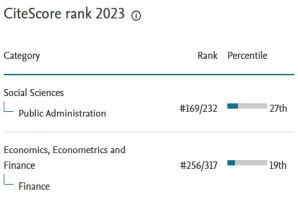A szabályalapú költségvetés és a pénzügyi stabilitás – az európai megoldás
DOI:
https://doi.org/10.35551/PFQ_2023_3_1Kulcsszavak:
fiskális politika, válságkezelés, adósságkezelés, költségvetési stabilitás, B15, E62, H15, H61, H63, L38, P48Absztrakt
A szerző a magyar Költségvetési Tanácsnál (KT, Tanács) töltött tizenkét éves szolgálata nézőpontjából tekinti át a világ mintegy hatvan államában több évtizede alkalmazott ún. szabályalapú költségvetési gyakorlat érvényesülését, szerepét a pénzügyi stabilitás megteremtésében és fenntartásában. A cikk utal a fiskális szabályok betartásán őrködő intézményeknek a hozzájárulási lehetőségeire a gazdasági krízisekkel szembeni ellenállóképesség erősítésében. Bemutatja az európai uniós és a magyar szabályozás kapcsolódásait, valamint azokat a főbb elgondolásokat, amelyek a költségvetési felelősség jobb érvényesítése érdekében a rendszer további fejlesztését szolgáló szakmai-politikai döntések előkészítése során születtek. Bizonyítja, hogy a honi pénzügypolitikának és – annak éves megvalósulásaként – a költségvetési gyakorlatnak hasznos, megkerülhetetlen részévé váltak a bevezetett keretszabályok és az azok betartásán őrködő szervezet.
Hivatkozások
State Audit Office, [2007]: Theses on public finance regulation (Közpénzügyek szabályozásának tézisei), download: 20.02.2023
Báger Gusztáv (2006): Az állami szerepvállalás új vonásai a xxi. század globalizált világában in: Vigvári, András (szerk.) Vissza az alapokhoz! : tanulmányok a közpénzügyi rendszer reformjáról, Budapest, Magyarország : Új mandátum könyvkiadó (2006) 255 p. pp. 9-41. , 33 p.
Belu Manescu, C., and Bova, E., (2021), Effectiveness of national expenditure rules: Evidence from EU member states, VoxEU CEPR column.
Bova, E., Belu Manescu, C., National Expenditure Rules in the EU: An Analysis of Effectiveness and Compliance, European Commission, European Economy Discussion Paper 124, April 2020.
Darvas Zsolt-Wieser, T.-Zenios, S. [2019]: Memo to the Commissioner Responsible for Economic Afairs, in.: Demertrtzis, M.-Wolff, G. (szerk): baraver, Greener, Fairer: Memos to The EU leadership 2019-2024. Brugel, Brussels, pp. 98-113. https://www.bruegel.org/sites/default/files/wp-content/uploads/2019/09/BRAVER-GREENER-FAIRER_Memos2019_1.pdf, downloaded: 19.02.2023
Debrum, X. – Jonung, L. [2019] : Under Threath,: Rule based Fiscal Fiscal Policíóy and How to PreservwIt. in.: European Journal of Fiscal Political Economy, vol. 57. pp. 142-157 https://Www.Econstor.Eu/Bitstream/10419/260258/1/Wp2018-029.Pdf, downloaded: 19.02.2023
European Commission, “Has ownership of the EU’s fiscal rules been strengthened by national fiscal Framework?”, Chapter IV.4 in Report on Public Finances in EMU 2018, European Commission, European Economy Institutional Paper 095, January 2019.
European Commission , “Do national fiscal rules support numerical compliance with EU fiscal rules?” Part IV in Report on Public Finances in EMU 2021, European Commission, European Economy Institutional Paper 181, July 2022. https://economy-finance.ec.europa.eu/publications/report-public-finances-emu-2021_en, downloaded: 24.02.2023
European Commission [2022]: “Communication on orientations for a reform of the EU economic governance framework”, COM(2022) 583 final
Cristiana Belu Manescu, Elva Bova, Martijn Hoogeland and Philipp Mohl[2023]: Do National Fiscal Rules Support Numerical Compliance with EU Fiscal Rules? European Commission, Discussion paper 181 | February 2023, https://economy-finance.ec.europa.eu/system/files/2023-02/dp181_en.pdf, downloaded: 24.02.2023
Franco, D. [2011]: Fiscal Policy Councils: Why do we need them and what makes them effective? Comments on “The role of fiscal policy councils in Theory” by Xavier Debrun, Conference on “Fiscal Policy Councils”: Why do we need them and what makes them effective? Vienna, 31 January 2011
Roel W.M.J. Beetsma and Xavier Debrun [2016]: Fiscal Councils: Rationale and Effectiveness International Monetary Fund WP/16/86 IMF Working Paper Fiscal Affairs Department Fiscal, https://www.imf.org/external/pubs/ft/wp/2016/wp1686.pdf, downloaded: 24.02.2023
Fromage, D. [2017]: Creation and Reform of Independet Fiscal Institutions in member states: incomplete and Insufficient Work in Progress?, in.: Beukers, T.-de Witte, B. – Kilpatrick, C. (eds.): Constitutional Change trough Euro-Crisis Law, Cambridge University Press, pp. 108-142. https://www.cambridge.org/core/books/abs/constitutional-change-through-eurocrisis-law/creation-and-reform-of-independent-fiscal-institutions-in-eu-member-states-incomplete-and-insufficient-work-in-progress/95,downloaded: 24.02,2023
László Jankovics [2021]: Independent fiscal institutions in European economic governance (Független fiskális intézmények az európai gazdasági kormányzás rendszerében) In: Péter Halmai (ed.) The future of Economic and Monetary Union: European Perspectives (A Gazdasági és Monetáris Unió jövője: Európai perspektívák), Budapest, Hungary: Ludovika University Press (2021) pp. 288, 99-113., 15
László Jankovics [2022]: Assessment of the EU’s fiscal framework and the way forward: persisting tensions between risk reduction and risk sharing pp. 1-23., 23 p. (2022) Bruges European Economic Research Papers, Volume: 2022, Booklet: 42,
György Kopits [2013]: Restoring Public Debt Sustainability – The role of independent Fiscal Institution, Oxford University Press, 2013
Árpád Kovács [2013]: Crisis Management similarities and Differences in the Newly Accessed Central and Eastern Europien Countries, In: Ed.: Farkas Beáta The Aftermath of the Global Crisis in the European Union. Newcastle upon Tyne: Cambridge Scholars Publishing, 2013, pp. 152-177.
Árpád Kovács [2014]: Fiscal councils in the Countries of Eastern-Central Europe, Public Finance Quarterly 2014/3, pp. 345 – 363.
Árpád Kovács [2016]: The Fiscal Council in the Hungarian Fundamental Law Sketch on the Development of the Institution and the European Union Practice, Public Finance Quarterly, 2016/3, pp. 320-337.
Gábor Kutasi [2012]: Fiscal rules and institutions in the EU. South-East Europe, International Relations Quarterly, Vol. 3, No. 1, pp. 1-11
Mohl, P., Mourre, G., Langedijk, S., Hoogeland, M., Does Media Visibility Make EU Fiscal Rules More Effective?, European Commission, European Economy Discussion Paper 155, December 2021 https://economy-finance.ec.europa.eu/publications/does-media-visibility-make-eu-fiscal-rules-more-effective_en, downloaded: 25.02.2023
Gábor Oblath – György Szapáry [2006]: Hungarian fiscal policy: quo vadis? Economic Review, No. 4, pp. 293-309.
Ódor, L. [2014]: The good, the Bad and the Ugly – Lesons of the first phase of implementation of the Nem European fiscal framework, Discussion Paper No. 3/2014, CBR, www.ropoctovarada.sk
Pench, L., Ciobanu, S., Zogala, M., and Belu Manescu, C., (2019), Beyond fiscal rules: How domestic fiscal frameworks can contribute to sound fiscal policy, VoxEU CEPR column.
##submission.downloads##
Megjelent
Hogyan kell idézni
Folyóirat szám
Rovat
License
Authors assign copyright to Pénzügyi Szemle / Public Finance Quarterly. Authors are responsible for permission to reproduce copyright material from other sources.












